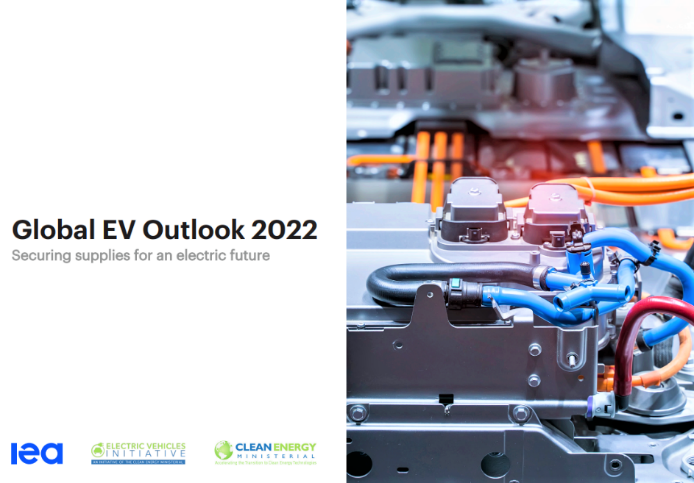In the first half of the year, Volvo, KIA, and other manufacturers successively launched new electric cars in Taiwan. The first batch of Toyota's new all-electric car bZ4X sold out in just half an hour, with thousands of orders waiting to be fulfilled. Taiwan sold fewer than 7000 electric cars last year, accounting for less than 2% of the market share. But it is not hard to tell that the electric car's time has come!
Electric cars may consume nearly 4% of global electricity by 2030! Prevent power grid paralysis by differential electricity pricing and smart systems According to IEA's latest Global EV Outlook 2022, 6.6 million new electric cars were sold worldwide in 2021, with 16.5 million electric cars on the road to date, triple the amount in 2018. Back in 2012, only 120,000 electric cars were sold worldwide in a year. Fast forward ten years, the same number of cars can be sold in a week. Electric cars now account for 9% of the global market share, becoming the center of attention. Regarding other regions, China, which sold 3.3 million electric cars last year, is still taking the lead. Coming a close second is Europe (2.3 million cars), the most diligent in promoting energy conservation and carbon reduction. Together, the two account for more than 80% of global sales. As for the United States, home to the most popular brand Tesla, 630,000 electric cars were sold.

IEA's latest Global EV Outlook 2022 (Source: IEA, 2022 Global EV Outlook)
A question that many people want to know: How much power do these electric cars consume? The answer is 55 billion kWh (55 TWh), which accounts for around 0.2% of the global electricity demand and is only slightly more than Taiwan's residential energy consumption (52.7 billion kWh) last year. An increasing number of countries are using electric vehicles to drive their carbon reduction policies. IEA estimates that by 2030, the power consumption of electric cars may soar to 3.9% and exceed 6% in Europe. Therefore, it is necessary to start reducing the overall grid load through smart charging, time-of-use pricing, and demand-side management. Not long ago, Taiwan stipulated "time-of-use pricing" for electric cars, with a difference of 4 times between peak and off-peak rates. This encourages car owners to charge their cars during peak sun hours or at midnight when electricity consumption is low, preparing for peak demand that may occur in the future.
The future carbon reduction potential is projected at 580 million tons, which is the total emission of the entire country of Canada Regarding carbon emissions, the biggest doubt about electric cars in the past is that their carbon reduction effect is not necessarily better than that of internal combustion engine vehicles (ICE). However, the IEA conducted an analysis two years ago. In areas where the emission factor per kWh is less than 0.518 kg, electric car emissions are lower than gasoline cars. Government statistics show that Taiwan's electricity carbon emission factor in 2020 was 0.502 kg, meaning electric cars do reduce more carbon than gasoline cars in Taiwan.
This year, the IEA updated the analysis data, emphasizing that on a global average, the "full life cycle" greenhouse gas emissions of electric cars, including mining, materials, production, use, scrap, and well-to-wheel stages, are 50% less than that of traditional gasoline cars! Do the math, and that is a net carbon emission of 40 million tons reduced by electric cars in 2021. Based on current policies, the carbon reduction potential by 2030 is estimated to rise to 580 million tons, which is the total emission of the entire country of Canada (the 10th largest emitter).
As products become more affordable, "range anxiety" can only be resolved by extensive construction of charging facilities Finally, we evaluate prices and charging facilities that consumers are most concerned about. The global average price of all-electric cars in 2021 was around US$36,000 (NT$1.04 million), a drop of 7% from the previous year, which is already quite competitive in the market. Looking at the Chinese market, which is the best at selling products, since small passenger cars are prevalent and manufacturing costs are low, the average price of electric cars in China is US$27,000, only a 10% difference from local traditional products. With the huge subsidies from policies, it is no wonder that China is leading the trend.
According to statistics from IEA's Global EV Outlook, there were 450 electric car models and styles on the market last year. The number of products was five times that of 2015, which shows that the industry is diving into the world of electric cars. In addition, the weighted average mileage is 350 kilometers (round-trip distance from Taipei to Taichung), which should meet the daily needs of most car owners.
As for charging infrastructure, there are nearly 1.8 million private and public charging points in the world, one-third of which are rapid chargers. The report found that the public expenditure on electric car subsidies and incentives in 2021 nearly doubled to US$30 billion. According to current policies, global electric car sales will exceed 20% by 2030, and ownership will also exceed 200 million. At that time, the number of charging facilities must be 12 times more than the current amount. Governments and private sectors worldwide must pick up the pace in construction to resolve the range anxiety of car owners.
In fact, Taiwan announced the "Roadmap to Net-Zero Emissions by 2050" at the end of March and plans to have newly sold cars and scooters be fully electric by 2040. Taiwan also installed charging stations at highways, gas stations, and public parking lots. But how can we achieve the target quickly? We still need more complete measures and economic incentives. Recently, Taipower announced a "dedicated power supply" solution and unveiled the first demonstration site incorporating an underground parking lot in Taiwan. The Ministry of Transportation and Communications also plans to install 6500 charging points by 2025. We are off to a good start. Global electric car sales are soaring every year. Transportation transformation is underway.
Global electric car sales are soaring every year. Transportation transformation is underway.

















